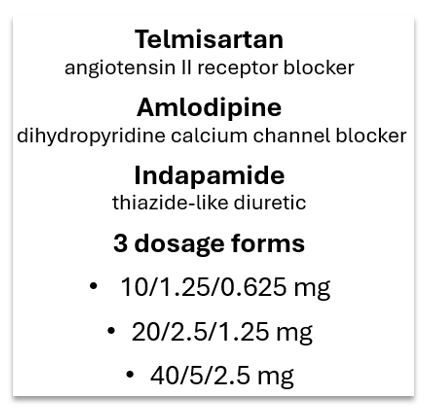- Clinical Technology
- Adult Immunization
- Hepatology
- Pediatric Immunization
- Screening
- Psychiatry
- Allergy
- Women's Health
- Cardiology
- Pediatrics
- Dermatology
- Endocrinology
- Pain Management
- Gastroenterology
- Infectious Disease
- Obesity Medicine
- Rheumatology
- Nephrology
- Neurology
- Pulmonology
George Medicines Announces FDA Approval of Polypill for Treatment of Hypertension in Adults
The novel triple fixed-dose combination of telmisartan, amlodipine and indapamide, is the first of its kind approved for initial treatment of hypertension.
George Medicines has announced FDA approval of the company’s fixed-dose triple combination pill containing telmisartan, amlodipine and indapamide (Widaplik, formerly GMRx2) for treating hypertension in adults, including as initial treatment. This marks the first FDA-approved triple combination medication available for initial therapy in patients who will likely require multiple drugs to achieve blood pressure goals, the company stated in a June 9th announcement.1

Planning for commercialization of the medication is underway with a launch in the US planned for the fourth quarter this year, according to the statement.1
The combination of 3 established antihypertensive agents—an angiotensin receptor blocker, a calcium channel blocker, and a thiazide-like diuretic—comes in 3 formulations, 1 standard and 2 lower doses, which allows clinicians to tailor treatment intensity while maintaining the benefits of triple-mechanism therapy early in the treatment pathway.1
The approval addresses a significant clinical need in the US where approximately half of adults aged 20 years and older have hypertension, but only 1 in 4 of those have achieved control of their blood pressure.2 Globally recognized treatment guidelines now recommend initiating combination therapy with low to moderate doses of 2 agents with complementary mechanisms of action. The recommendation suggests prescribing a single pill combination (SPC) vs prescribing each as a separate pill.3,4
"Single pill combination antihypertensive therapy has great potential to improve hypertension control in the US and worldwide. Most patients with hypertension need multiple therapies to achieve their blood pressure goals. The new dose options available with [fixed-dose telmisartan, amlodipine and indapamide ] offer a treatment regimen that could benefit a broad range of patients, including those just starting treatment," Paul K. Whelton, MB, MD, MSc, Show Chwan Health System Endowed Chair in Global Public Health at Tulane University, said in the release.1
The FDA’s decision was supported by safety and efficacy data from 2 international phase 3 trials that compared the fixed dose triple combination to placebo and against all possible dual combinations of its component agents. The first trial evaluated 2 doses of the polypill against placebo among 295 adults with hypertension receiving either no treatment or 1 medication. The study found that compared with just 30% of the placebo-treated group, 65% of participants assigned to the ultra-low dose and 70% assigned to the low-dose polypill achieved in-office BP of less than 140/90 mm Hg at follow-up.5

For the second trial, after 12 weeks of treatment, blood pressure was assessed as controlled in nearly three-quarters (74%) of participants receiving the triple combination. Smaller proportions achieved control among those assigned to any of the dual combination comparators (amlodipine/telmisartan, 54%; amlodipine/indapamide, 61%; telmisartan/indapamide, 61%).6
The medication's safety profile reflects its established component drugs, according to the statement. In clinical trials the most common adverse event among polypill-treated participants was symptomatic hypotension. Telmisartan/amlodipine/indapamide is contraindicated for individuals with anuria, known hypersensitivity to any component drugs (including other sulfonamide-derived drugs), and co-administration with aliskiren restricted in adults with diabetes. A boxed warning addresses fetal toxicity risks, requiring discontinuation when pregnancy occurs.1
"Data show that most patients with hypertension will require two or more medicines to bring their blood pressure under control. Telmisartan/amlodipine /indapamide can provide patients with hypertension, including those who are starting treatment, with a different approach to control their blood pressure," Mark Mallon, chief executive officer of Georges Medicine said in the statement.1
